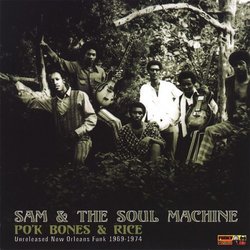New Orleans' Soul Machine: Lost & Found
J P Ryan | Waltham, Massachusetts United States | 07/31/2006
(4 out of 5 stars)
"Sam & The Soul Machine were a band connected at birth with The Meters. As Meters fans may know, during 1967 The Meters played New Orleans clubs as a 7-piece band called the Neville Sound; later that year a club owner offered the group - which had included Cyril and Aaron Neville as well as a sax player - a residency, but only able to acommidate four pieces, Cyril, Aaron, and the sax were dropped. With only one Neville left the group's name was changed to The Meters, and after Allen Toussaint caught the group live the legendary producer started using them on sessions by Willie West, Lee Dorsey, Betty Harris, and others on his and Marshall Sehorn's Sansu label. Meanhile Cyril joined forces with Sam Henry (late of the Sam Henry trio, which included guitarist Leo Nocentelli!) to form the Soul Machine, and before long the group became hot in N.O. clubs, but never gained much attention outside the city. Meanwhile, during 1968 Josie Records signed The Meters.
By early 1969 The Meters were hitting the national charts. Allen Toussaint arranged for Sam & The Soul Machine to record an album at Cosimo Matassa's studio; shortly thereafter the IRS closed in on Matassa for tax evasion, confiscating assets and master tapes that included the unreleased Soul Machine album. Thirty-five years later, Funky Delicacies has restored and issued this legendary lost artifact in New Orleans' musical history.
Compared to the Meters - which is inevitable if not fair - these guys have a more langourous, laid back approach, and in Gary Brown a prominent and talented sax player (whiich leads one to guess it may be Brown who plays on the Meters' debut album bonus track called 'Soul Machine.'). For some reason, Cyril Neville, who drummed at gigs and appears on this CD's group cover photo, was replaced by Henry for these spring 1969 sessions by one Joseph Modeliste, whose style and virtuosity is unmistakeable. That was a fortuitous choice, for what better drummer could one hope for in a funk/soul band? Though the music doesn't emphasize the amazing syncopated rhythmic telepathy as the Meters' does, one can hear Modeliste catch fire on the J.B.'s-style workout "Meditation," and elsewhere. Henry himself is not as rhythmic an organ player as Art Neville - his sound more fully suffuses the music and his playing is less percussive than Neville's. Guitarist Eugene Sinegal is a more blues influenced player than Leo Modeliste - check out the title track. And though nobody competes with the Meters, comparisons - whatever these guys' origins - should end when you hear this long lost album. The tracks are indeed funky, laid back and if the sonics aren't up to Sundazed's state of the art remastering job on its Meters reissues, this band has its own identity and skills, and the music grooves along nicely. And there's no question they can play - the music is strong enough to make one wonder what might have happened if the S.M. had gotten its break instead of having this master lying around Sam's quarters all these years. Besides a terrific, jazz- and r & b- influenced funk set, bonus tracks are included (without annotation as to who's playing or singing), by an edition of the group that emphasized vocals more than the original, and that put out one or more singles (the cover states these recordings are from 1969 - 74). In the mid '70s, the S.M. moved to Nashville, played regularly at one of James Brown's clubs until 1978 when, live bands falling by the wayside with the ascendence of disco, Brown himself let the Soul Machine go and turned his club into a disco. Sam Henry later taught music in New Orleans' public school system. Cyril Neville, who had a Meters-backed solo single out on Josie in late '69, soon was playing congas with that bandand by the mid '70s was an official Meter.
Meters fans with copies of that group's debut on CD, take note of the track "Gospel Bird." Fans of N.O. r & b, or funk, check this set out and enjoy the inventive arrangements and raw power."


 Track Listings (18) - Disc #1
Track Listings (18) - Disc #1